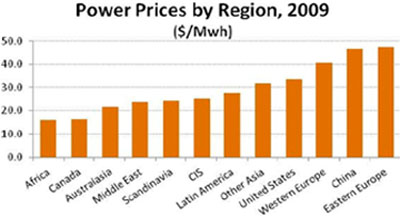Announcing Streetwise Live! Events
Source: Streetwise Reports (07/13/2020)
 Streetwise Reports is offering 100 investors—at no charge—the opportunity to meet via Zoom with executives of precious metals companies as they discuss recent developments at their companies and upcoming catalysts.
Streetwise Reports is offering 100 investors—at no charge—the opportunity to meet via Zoom with executives of precious metals companies as they discuss recent developments at their companies and upcoming catalysts.
read more >
China's REE Stranglehold Is Canada's Opportunity
Source: The Epoch Times, Matthew Little (08/12/2010)
"China's export quota could be opportunity for Canadian miners"
read more >
Latin America: Six Gold Juniors Amass 100M+ Ounces
Source: Marc Davis, BNW News (05/25/2010)
Latin America, the world's last great mineral frontier for prolific gold discoveries, is proving a godsend for some lucky investors.
read more >
Mexico: Gold's Next Powerhouse Player
Source: Marc Davis, BNW News (11/03/2009)
As the world's key gold producing nations struggle mostly in vain to replenish dwindling below-ground supplies, Mexico is bucking the trend in a big way.
read more >
Where Have All the Gold Mines Gone?
Source: Brent Cook, Exploration Insights (04/14/2009)
Given the declining global gold production, mining companies’ demand for reserve replacement and the acute dearth of new gold discoveries, there is no doubt that real economic discoveries will be exceptionally valuable. . .the opportunity for stellar profits is the best it has probably ever been. Identifying the few successes, however, will require vigilant and constant technical assessment of geology and drill results, always with an eye to mine economics.
read more >
Congo Completes Mining Review, Says Majors Quit Talks
Source: Reuters (12/20/2008)
"Review process is extended an additional 45 days to allow six companies to return to the negotiating table for direct talks with government ministers."
read more >
Rare Element Resources Ltd: Strong Recommendation & the Second Way to “Skin a Cat” with Mining Share Profits
Source: Mining Insights (04/29/2008)
I haven’t spoken to my old mining stock friend, noted and universally respected gold stock guru, Bob Bishop, about Rare Element in a year, but I hear he is still a supporter and very large shareholder. I don’t believe he will hold it against me to remind you that this was one of his favorite holdings when he left the newsletter writing business. . .
read more >
It's Only the Beginning for Uranium
Source: www.financialinsights.com (06/03/2005)
Dr. Richard S. Appel, author of Financial Insights, first became bullish on uranium in mid-2003, when it appeared obvious that its supply versus demand equation was fated to seriously drive higher its price. Since then, a series of events in the uranium industry has led Appel to believe that uranium prices will reach never before seen levels.
read more >
(00/00/0000)
read more >



















































